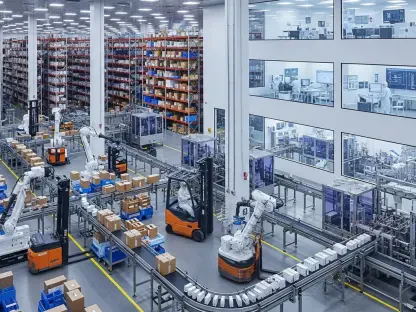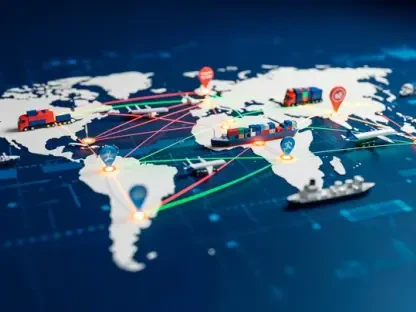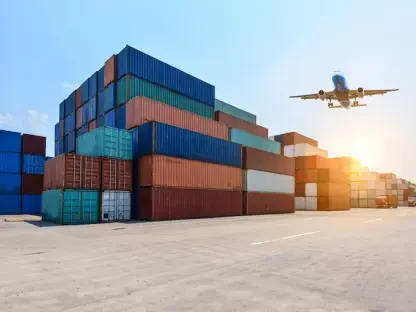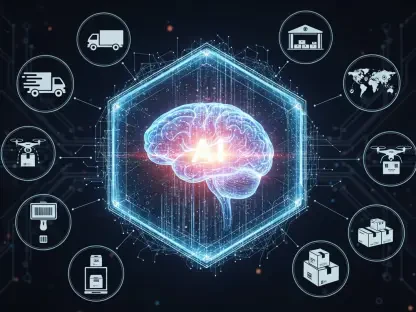The logistics industry is on the brink of a technological revolution driven by the critical need to optimize operations, enhance efficiency, and meet the soaring demands of e-commerce and global trade. As we look towards 2024 and beyond, several key trends and innovations are set to transform supply chains, making them more resilient, efficient, and customer-centric. This transformation is essential as supply chains have become more complex and interconnected, requiring more sophisticated tools and technologies to manage. The integration of cutting-edge technologies will not only streamline processes but also redefine the way businesses operate within the logistics domain.
Increasing Tech Investments in Logistics
A recent study by MHI and Deloitte reveals that a significant portion of supply chain leaders are ramping up their tech investments. With 55% of respondents increasing their spending and 88% planning to invest over $1 million, the confidence in technology’s potential to revolutionize logistics is evident. Notably, 44% aim to spend more than $10 million, underscoring the robust commitment to digital transformation. These substantial investments reflect a deep understanding of the critical role technology plays in modernizing logistics.
These investments are not just about keeping up with the competition; they are about staying ahead. The logistics sector is increasingly recognizing the importance of integrating advanced technologies to address the complexities of modern supply chains. This shift is driven by the need to manage dynamic environments, reduce costs, and improve service levels. Companies are focusing on leveraging technologies such as automation, AI, and data analytics to achieve these goals.
Data-Driven Visibility Solutions
One of the paramount trends in logistics technology is the implementation of data-driven visibility solutions. These analytics tools are essential for managing the constantly changing environments characteristic of logistics. Supply chain disruptions are ubiquitous, prompting businesses to swiftly convert real-time global logistics data into actionable insights. The shift towards data-centric operations marks a significant change from bureaucratic processes to a focus on customer-centric strategies.
Digitized solutions like the Magaya Digital Freight Portal exemplify this transition by providing customers with greater control, self-service capabilities, and real-time access to shipment information. This enhanced visibility allows companies to respond more effectively to disruptions and maintain high service levels. By leveraging data-driven visibility solutions, businesses can improve their decision-making processes and optimize their supply chain operations.
Process Automation in Logistics
Process automation is another significant theme reshaping traditional supply chain practices. Many logistics companies are leveraging automation to enhance operational efficiency and drive innovation. Automated tools and solutions are not merely streamlining processes but also providing a competitive edge in the marketplace. For instance, TrueCommerce EDI helps companies automate order processing, accelerate fulfillment, and improve inventory management.
A Descartes study supports this by showing that more than half of supply chain and logistics leaders are looking to technology to automate non-value-added and repetitive tasks. This automation effort is aimed at boosting worker productivity and mitigating workforce shortages. By automating routine tasks, companies can free up their workforce to focus on more strategic activities that add value to the organization. Additionally, process automation can help reduce errors, improve accuracy, and enhance overall efficiency.
The Rise of Artificial Intelligence
Artificial Intelligence (AI) represents a massive opportunity within the logistics sector. AI adoption is at an all-time high, with 84% of supply chain leaders planning to integrate AI technologies within the next five years. AI is transforming the logistics industry through predictive analytics, converting shipping data into valuable insights. For example, Banyan Technology’s Truckload AI leverages predictive spot rate pricing using aggregated market data, transaction history, and machine learning techniques.
AI’s capability to forecast accurately, optimize routes, and streamline freight management is making supply chains more efficient and resilient. The integration of AI is not just about automation; it’s about making smarter, data-driven decisions. By using AI to analyze large volumes of data, companies can identify patterns, predict future trends, and make informed decisions to optimize their supply chain operations.
Generative AI: A Defining Technology
In addition to general AI, Generative AI (GenAI) is becoming a defining technology in 2024, significantly impacting the logistics industry. GenAI helps automate tasks and improves decision-making speed and quality. It enables companies to respond swiftly to supply chain disruptions and volatility. Solutions like Blue Yonder Orchestrator and Uber Freight’s InsightsAI exemplify how GenAI provides predictive insights and shippers with context-specific recommendations.
Similarly, Fourkites’ Fin AI and project44’s Movement GPT are noteworthy examples of GenAI-based solutions that help users manage disruptions and interact with supply chain systems more intuitively and efficiently. GenAI’s ability to generate complex models and simulations can enhance supply chain planning and forecasting, leading to more accurate and effective decision-making. The adoption of GenAI is expected to revolutionize the logistics industry by enabling companies to adapt quickly to changing market conditions and demands.
API Integration for Enhanced Interoperability
API integration is another vital trend addressing the fragmented nature of the supply chain tech ecosystem. The disparate technologies and varying data standards have led to inefficiencies and higher operational costs. To address this, companies like FourKites, Uber Freight, and Blue Yonder have joined the Scheduling Standards Consortium (SSC) to standardize the API interface. A universal API promises substantial improvements in reducing redundancies and fostering innovation.
By enhancing interoperability and streamlining the appointment scheduling process, these standardized APIs are set to revolutionize how different systems within the logistics ecosystem communicate and collaborate. This improved interoperability can lead to more efficient and accurate data exchange, reducing the risk of errors and miscommunications. As a result, companies can achieve better coordination and synchronization across their supply chain operations.
Embracing Environmental Sustainability
The integration of emerging technologies and data utilization is crucial in addressing several logistical challenges, including environmental sustainability. As the logistics industry faces increasing pressure to reduce its carbon footprint, technology plays a pivotal role in achieving these goals. Predictive analytics and AI can optimize routes and reduce fuel consumption, while process automation can minimize waste and improve resource utilization.
By embracing these technologies, logistics companies can not only enhance their operational efficiency but also contribute to a more sustainable future. Implementing environmentally-friendly practices and technologies can help companies reduce their environmental impact and comply with regulatory requirements. This focus on sustainability can also enhance a company’s reputation and appeal to environmentally-conscious consumers.
Customer-Centric Strategies
The logistics industry stands on the cusp of a significant technological revolution driven by the urgent necessity to optimize operations, improve efficiency, and address the escalating demands of e-commerce and global trade. As we project into 2024 and beyond, several pivotal trends and innovations are poised to reshape supply chains, rendering them more resilient, efficient, and customer-focused. This transformation is crucial, given that supply chains have grown increasingly complex and interconnected, thus necessitating the use of more advanced tools and technologies for effective management. The integration of state-of-the-art technologies will not only enhance processes but also redefine how businesses function within the logistics sector. Technologies like artificial intelligence, machine learning, blockchain, and the Internet of Things are set to play a crucial role. These innovations are anticipated to bring about significant improvements in inventory management, predictive maintenance, real-time tracking, and overall operational efficiency, setting a new benchmark for the industry.









